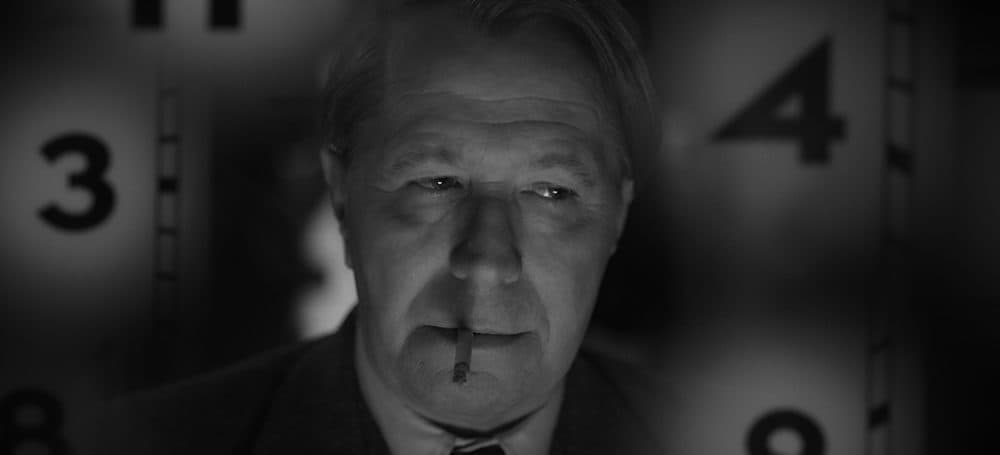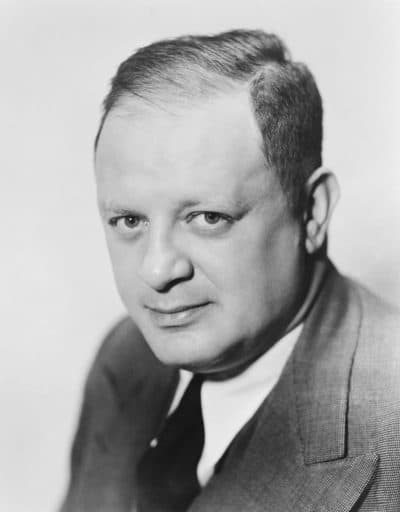Advertisement
'Brilliant' But 'Full Of Self-Hate': The Man Behind 'Citizen Kane' Inspires Netflix’s 'Mank'
Resume
Herman Mankiewicz, the screenwriter commissioned by Orson Welles to pen “Citizen Kane,” is the focus of the new Netflix film “Mank.”
Mankiewicz, played by actor Gary Oldman, fiercely battled over writing credit for the film with Welles, the 25-year-old who in 1940 produced, directed and starred as Kane, a thinly veiled version of real-life media titan William Randolph Hearst. A great Hollywood feud ensued.
“Mank,” written by the late Jack Fincher and directed by his son David Fincher, comes down firmly on the side of Mankiewicz. So did critic Pauline Kael in an infamous 1972 essay after which director Peter Bogdanovich came to Welles’ defense.
Josh Mankiewicz, grandson of Herman Mankiewicz and NBC journalist best known for his reporting on “Dateline,” says growing up, there was never a debate about who wrote “Citizen Kane.”
Ben Mankiewicz, another grandson and host on Turner Classic Movies, says he gets why people came to Welles’ defense because Kael’s piece was seen as diminishing the director’s contribution to the historic film. And Welles’ accomplishments were clearly outstanding, Ben Mankiewicz says.
Welles “produced it in the face of these enormous headwinds, directed it in a way that changed the way movies are directed and delivered this dazzling performance,” Ben Mankiewicz says.
But all in all, he argues that while it is Welles’ movie, Herman Mankiewicz conceived and mostly wrote the screenplay.
Eventually, the two men shared the credit and an Oscar for the precedent-setting film.
“Mank” takes a peek into Herman Mankiewicz’s life as the head of a great family — one that spawned the late journalist Frank Mankiewicz, once president of National Public Radio and press secretary to Robert Kennedy — but also a father who struggled with alcoholism, the cause of his early death.
Neither Josh nor Ben Mankiewicz met their grandfather but heard about him almost “mythically” throughout their lives.
Herman Mankiewicz’s career spanned far and wide. He was the Berlin correspondent for the Chicago Tribune, the drama critic for The New York Times, the first regular drama critic at The New Yorker, and a script fixer on many films including “The Wizard of Oz” and “Man of the World,” among others.
In “Mank”, viewers see a nod to another side of Herman Mankiewicz, such as his efforts to help Jews escape Nazi Germany. But ultimately, in the film, he’s depicted as a court jester, the term studio heads would call him.
In addition to his heavy drinking, Herman Mankiewicz had another fatal flaw — a deep-seated belief that his work didn’t matter and wasn’t good enough.
Josh Mankiewicz says the Herman Mankiewicz in “Mank” is exactly the person who he heard about growing up — “brilliant, funny, literate, kind, a mensch, full of self-hate.”
“The only person that didn't believe he was a great, wonderful, talented guy was Herman. And he sort of took that out on himself,” Josh Mankiewicz says. “And in the end, he paid for it and we did, too.”
Interview Highlights
On how Herman Mankiewicz’s son, Frank Mankiewicz, was affected by his father’s actions
Ben Mankiewicz: “First of all, my dad didn't drink and he didn't really gamble, the two primary sins that destroyed Herman. But mostly, of course, what destroyed Herman was that sort of self-loathing that he didn't think anything he'd contributed mattered. He didn't think these movies mattered. So, you know, I want to go back and I think my father did, too, you know, and especially as I spent the last two decades of my life talking about classic movies, you want to go back in time and shake him and go, ‘Hey man, no, this art form mattered.’ This was not a popcorn escapism and nothing else. This is a valuable, signature American art form, and he would have been enormously proud of it. Clearly, one reason for fighting for the credit on ‘Citizen Kane’ was that he thought he had finally written something worthwhile, something that mattered.”
Josh Mankiewicz: “He was the father that Herman, I think, was not. He was always there. He went to every one of Ben's high school basketball games. He took me out of school to go to campaign events in 1968 and 1972, which was a tremendous education. He made sure that the childhood he didn't have, his kids did have.”
On how Herman Mankiewicz made an enemy out of William Randolph Hearst, the subject of “Citizen Kane,” and how Hearst used his empire to take down Herman after his drunken fender bender

BM: “First of all, so people understand William Randolph Hearst, he was much more than Rupert Murdoch. He was. But he was like Rupert Murdoch and CBS and NBC and ABC and The Washington Post and The New York Times …”
JM: “And Mark Zuckerberg.”
BM: “And Mark Zuckerberg. I mean, he was by far the most powerful media figure of the 20th century. So when my grandfather had this fender bender, the Hearst people at the Beverly Hills Police Department alerted the Hearst paper and The Examiner put it on the front page like it was the biggest story in the world. This was in the ‘40s. And the trial was on the front page again, like it was, you know, it was the O.J. Simpson trial. And then my father was at Camp Roberts getting ready to go overseas and fight in the Second World War. My dad would, he said, sprint to the PX [Post Exchange] where they sold the papers and The Examiner was the afternoon paper and he would buy all of the afternoon papers that covered the story about his father drinking and having this accident, and he would throw them away.”
JM: “I either heard or always believed that my dad buying the newspapers and throwing them away so that others couldn't read them was the inspiration for the scene in “Absence of Malice” in which Melinda Dillon's character picks up the morning paper on her neighbor's lawns and throws them away so that her story of how she was involved with the Paul Newman character won't get out.”
On the Mankiewicz family
JM: “I mean, I saw a lot of people at the dinner table who I later saw on the evening news. I remember, when I was 17, I went on a trip to England and I went to Pinewood Studios where [Herman Mankiewicz’s brother] Joe [Mankiewicz] was shooting "Sleuth." And now whenever I see “Sleuth,” I remember that I was on that set and I sat in that chair. But I mean otherwise, life was pretty much normal.”
BM: “My dad never put an ounce of pressure on us to do big things. Smart things really was all he was concerned with. But there was a weight of expectation that just comes with the name. We think that the smartest person in the family was our father, one of the smartest people of his generation. And all those great people who worked at NPR when he was there from the late ‘70s into the early ‘80s, I mean, almost uniformly, they say whenever Frank was in the room, you knew that was the smartest guy in the room. So we had this dad who I sort of just decided at age, you know, 12 or 13, I could be maybe successful in life, but I'm never going to be like my father. You just can't. But that weight of expectation never goes away. It still exists now.”
On watching their grandfather portrayed in “Mank”
JM: “Look, it was surreal to see the guy I never met but always heard about suddenly in my living room. I thought the movie was great. You do kind of want to, if you're a Mankiewicz, reach through the screen and slap him. But it was great to be able to finally meet him in a fashion. It was.”
BM: “It was an incredibly emotional experience. And Fincher told me he didn't see it as about the credit for ‘Citizen Kane.’ There's a tremendous amount of focus on that, and I certainly understand. He wanted to tell the story of the screenwriter and how important screenwriting is in Hollywood and this guy's personal struggle to achieve despite this instinct that he didn't deserve to achieve. I don't know, man. He seemed fun and loved by his peers and the people who he alienated, William Randolph Hearst and studio executives, well, that's not so bad.”
Emiko Tamagawa produced and edited this interview for broadcast with Todd Mundt. Serena McMahon adapted it for the web.
This segment aired on December 21, 2020.

